Disclosure: Meeple Mountain received a free copy of this product in exchange for an honest, unbiased review. This review is not intended to be an endorsement.
For those unfamiliar with Dixit, it’s a game of creative word associations and voting. Players are given a hand of lavishly, bizarrely illustrated cards and, on their turn, are asked to select a card from their hand and provide a clue for it. Keeping the card hidden, the player says their clue and the other players all select a card from their own hands that they think could also fit the clue. These cards are collected and shuffled together along with the clue giver’s card and each is laid out face up. Then the players vote on which card they think belongs to the clue giver. People that guess correctly score points. People that fool other people into thinking that their card was the one the clue giver had laid down score points. It’s a very simple game, beautiful in both its artistry and its elegance.
Unless you stink at giving out clues.
There are two types of people that play Dixit: those who relish the challenge of studying the cards in their hand to come up with a good clue and those who struggle with it. If you’re in the latter camp, there’s a good chance that you played Dixit once or twice and decided it wasn’t for you. And that’s a shame because Dixit is a wonderful game, one I recommend everyone experience at least once in their lifetimes.
If you’re the type of Dixit player that relishes trying to fool the other players but loathes having to come up with a clue on the fly when it’s your turn, then today’s your lucky day. Meet Stella: Dixit Universe (Stella). It’s the Dixit game for people who are awful at Dixit. Stella provides the clues for you. Your only job is to make the associations and hope that your associations match up with those of your opponents. The more matches you have, the more points you’ll score. If you’ve got the most points at the end of four rounds, you win.
The Big Bang
Stella is set up like this:
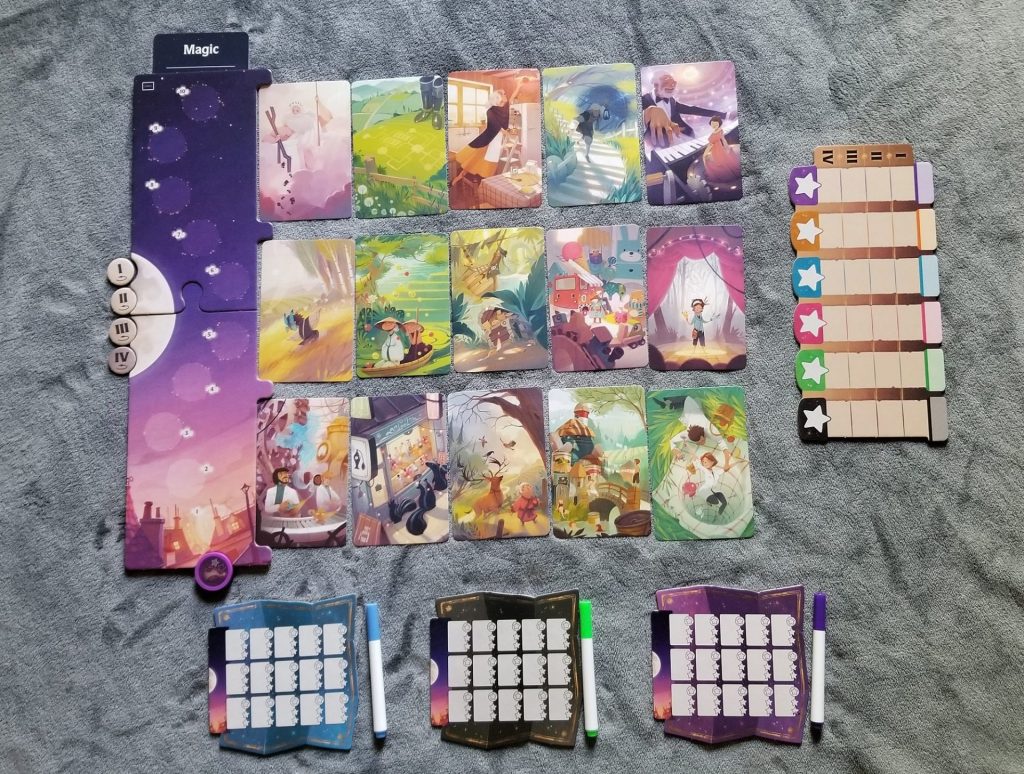
Assemble the board in the center of the table with the Round markers placed next to it in numeric order. Shuffle the deck of Dixit cards and create three rows of five cards. The remainder of the deck is placed off to the side along with the shuffled deck of Word cards and the Scoring Slate.
Then, each player receives their own Personal Slate (oriented so that the slates match the orientation of the card lineup from the player’s perspective) along with a dry erase pen and a cloth. The Lantern tokens matching the color of their selected Slate are placed in a stack at the bottom of the game board. Finally, a starting player is selected and given the First Scout pawn. Then you’re ready to begin.
The Universe Expands
The player holding the First Scout pawn reveals the top card of the Word card deck and places it beneath the top left of the game board so that only a single word is showing. Then the players begin making associations. If a player sees a Dixit card that they think matches the word on the Word card, they draw an ‘X’ onto their slate in that card’s position. All players will be doing this simultaneously, making sure to keep their slates hidden from the other players.
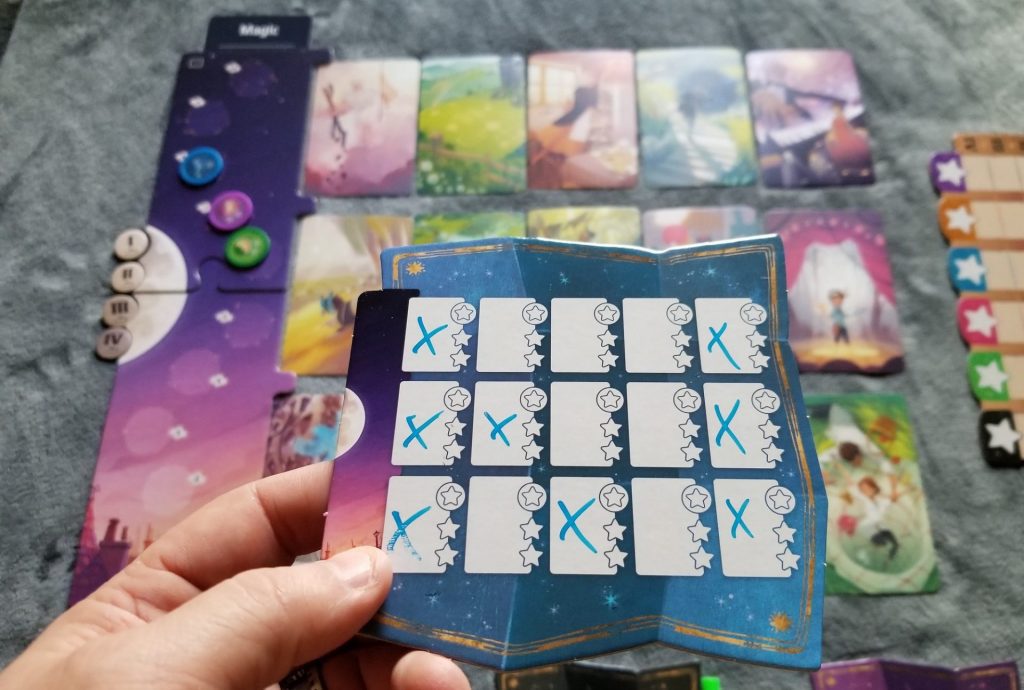
Once everyone is finished making their associations, each player will announce how many associations they’ve made and move their Lantern token up the track on the game board accordingly. If any player is alone in the lead, their lantern token is flipped to its dark side. The purpose of this will be made clear later.
Then, beginning with the person holding the First Scout pawn, the players take turns pointing out one of the cards they selected. If one of the other players selected the same card, then they “spark” and each matching player fills in two stars next to that card’s position on their Personal Slate. If there’s just one other player that selected the same card, they “super spark” and fill in three stars instead.
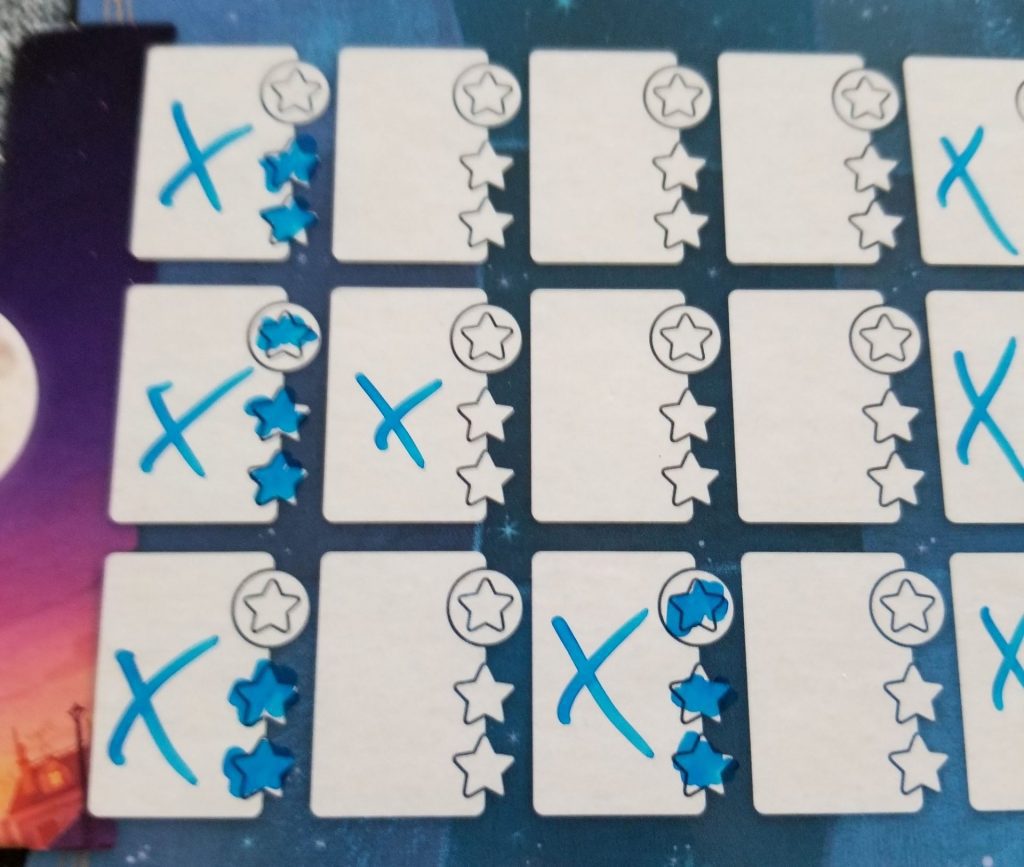
If a player points out a card and nobody else matches, that player “falls” and can no longer point out matches (meaning, they can’t score anymore points that round) but they can still cause other players to spark or super spark if their selections cause a match to be created. Once every player has fallen or run out of cards to point out, the round comes to an end and the players score points. Players score points equal to the number of stars they filled in. However, the player that turned over their Lantern token to its dark side (if there was one) will score one star less for each successful match.
At the end of the first three rounds, one of the rows of cards will be replaced. At the end of the fourth, the game is over and the player who has scored the most points wins.
Thoughts
I’ve been enamored with Dixit ever since my first playthrough. The fantastical images mixed with the fantastic gameplay all wrapped up into a nice, tidy approachable package–perfect for seasoned and unseasoned gamers alike–created a one-of-a-kind experience that left an indelible impression. It also didn’t hurt that the very first time that I played the game, the actual physical game was up for grabs. And I won it.
But winning a copy of the game aside, I was instantly able to recognize the elegant design that ebbed and flowed just beneath the surface. And I was taken by the unique social atmosphere that Dixit fosters. Not a session has gone by wherein several of the players weren’t in stitches because of a funny clue someone at the table had given, the result of a well-crafted joke whose punchline wasn’t apparent until the cards were flipped. Dixit builds camaraderie. It’s competitive enough that you feel like you’ve won when you actually win, but it also manages to feel like you’ve won even when you lose.
Not everyone loves Dixit, though. In many games that I’ve played, there’s at least one person at the table that just really hates giving out clues. Looking at those cards and having to come up with an obscure, but not too obscure, clue to describe the feeling that the image evokes requires a lot of on-the-spot imagination and creativity and, let’s face it, not everyone is cut out for that sort of thing. When it gets to be those people’s turn, it’s obvious that they’re struggling or, even worse, don’t care at all anymore. And that lack of enthusiasm kills the mood for everyone else at the table as well.
Stella is the answer to that conundrum. It simultaneously feels like Dixit, but like something else entirely. The oddball images on the cards are still there. The voting mechanism is still in place. That DNA that makes Dixit what it is can be felt all throughout Stella. And by providing the clue for you, it not only removes the onerous task of having to come up with one on your own (not that I personally find it onerous) but it also solves another issue that I often see crop up in games of Dixit: player familiarity. There will be many times where one or more players will toss out a clue that doesn’t make sense to anyone else outside of the circle of people that have intimate knowledge of why that clue was given. Were it not for that insider information, the clue would otherwise make zero sense. It gives certain players at the table an unfair advantage over the others. That just doesn’t exist in Stella.
Playing Stella feels a lot like playing Dixit, but there is enough differentiation that both games provide different experiences. One of the more surprising differentiations was the ability to play the game tactically. During my first game, a three player game, I was trailing the leader by almost ten points and that’s when I realized that I could conceivably catch up to them as long as I was able to outlast them. Remembering that I don’t have to match everything I selected to everything everyone else selected, just make sure they run out of selections before I do, I checked off nearly every card on my Personal slate. It was my hope that I could make a successful match on each of my turns regardless of how successfully they matched on theirs.
Of course, when it was my turn to point out a card, nobody matched, so my gamble only paid off for them as my Personal slate helped my opponents score super spark after super spark. It was rotten luck for sure. And this abysmal fortune shined a spotlight on Stella’s biggest weakness. This game does not play very well at lower player counts.
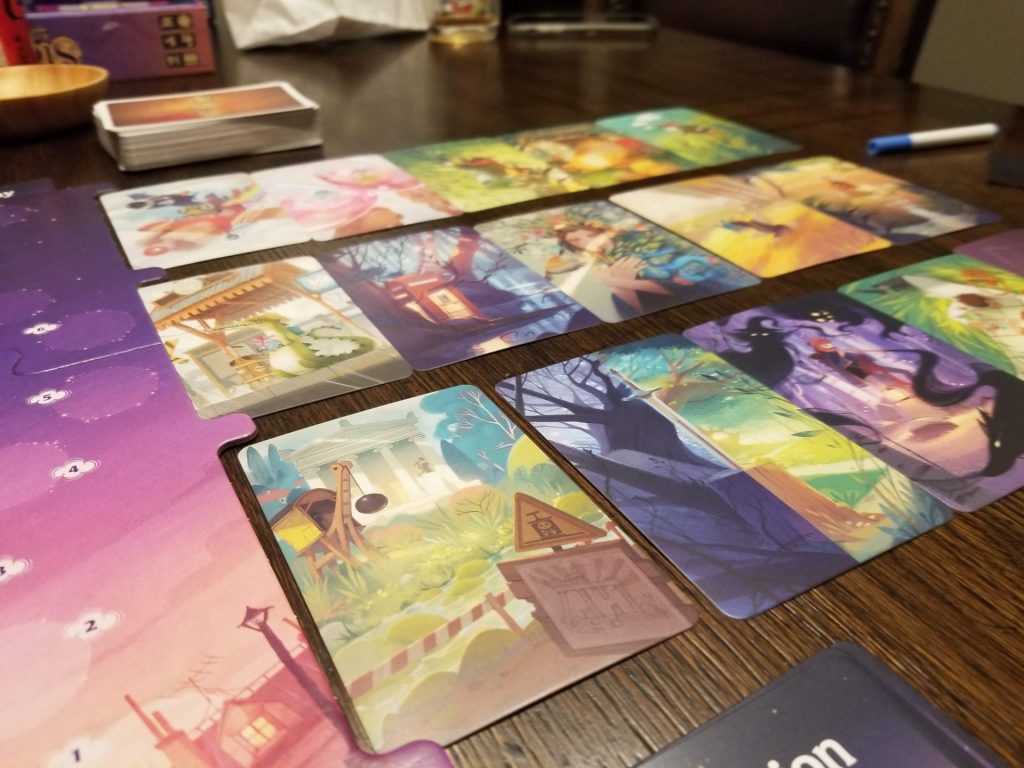
The minimum player count listed on the box is three players. This is a game about matching with other people, though. So the bigger the pool of people, the higher your chances of successfully matching become. In my three player games, I almost never match with the other players. A full cohort of six people, however, presents plenty of opportunities for matching and that has the net effect of creating a much more full bodied experience all around. Stella not only plays better with more players, it’s a lot more fun, too.
Aside from the issue with the player count, there was only one other aspect of the game that gave me pause. Remember my example a few paragraphs ago when I talked about crossing off almost every card on my Personal slate? Well, my preference would have been to mark off all fifteen, but the track on the game board only goes up to ten. Why is this? Why doesn’t that track have just as many spaces on it as there are cards in the display? If there’s some reasoning for that limitation, it escapes me.
That doesn’t stop me from enjoying Stella, though. I’m glad it’s part of my collection now. Do I feel like my collection really needs both Stella and Dixit in it? The answer to that is both a yes and a no. Yes, in that Stella’s a perfect fallback for when I’m in the mood for Dixit and am playing with someone that doesn’t enjoy the clue giving aspect of the game. And no, I think Dixit is the clearly superior game.
Much like playing The Castles of Tuscany just makes me wish I were playing The Castles of Burgundy instead, playing Stella just makes me really want to play Dixit.


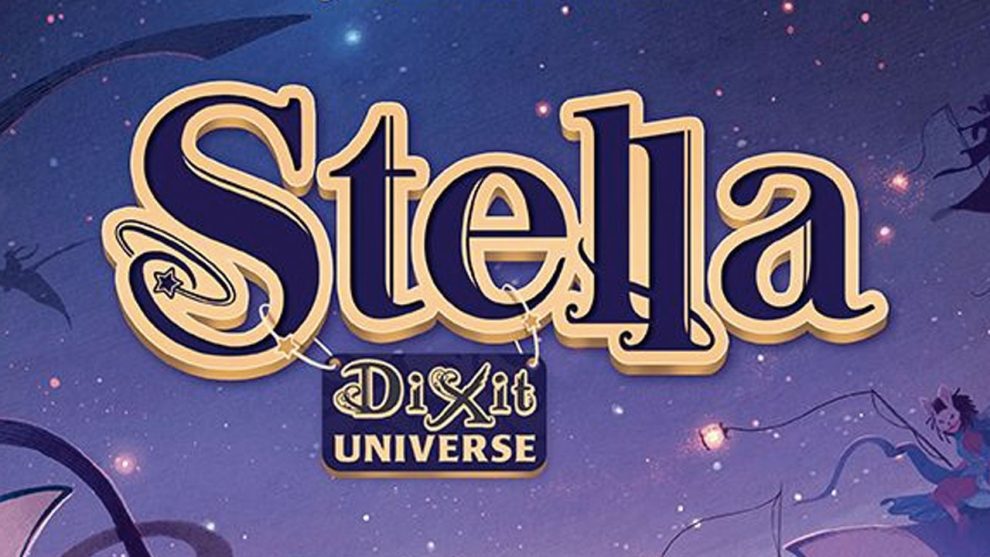

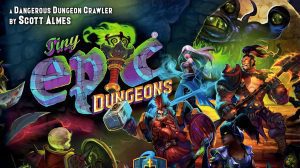

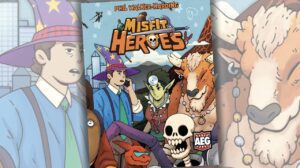





Add Comment